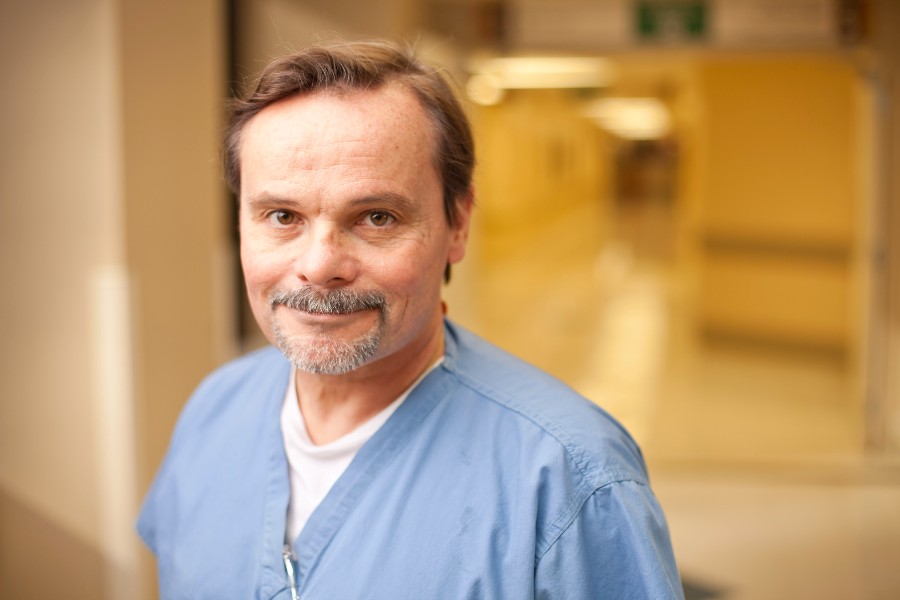College of Leadership & Public Service equips Vanderbilt medical professional to navigate conflict in health care
Dr. Roger Dmochowski gains conflict management skills to drive positive change in professionalism and patient care.
Keely Hagan | 615-966-6491 |

photo courtesy of Vanderbilt University Medical Center
In the fast-paced and often stressful environment of health care, effective conflict management can make all the difference.
Dr. Roger Dmochowski (MA ’23) serves at Vanderbilt University Medical Center as a practicing physician, professor of urology and surgery, associate surgeon-in-chief and vice chair for faculty affairs and professionalism, where he realized the need for tools and insights crucial to his approach in managing conflicts within his multifaceted roles.
Trained in conflict resolution, mediation and negotiation through the graduate program in the College of Leadership & Public Service at Lipscomb, Dmochowski says, “This degree has been a positive life experience. I had some unbelievable interactions with the faculty and some important conceptual exposures.”
Dmochowski emphasizes the critical need for conflict management skills in health care, an area often overlooked in medical training, because of the prevalence of conflict avoidance among health care professionals. It often inadvertently leads to a myriad of issues, including miscommunication, dysfunctional team dynamics and ultimately, suboptimal patient outcomes.
“In health care, conflicts not only arise between caregivers and patients but also among members of the health care team,” Dmochowski says. “The cascading effect of unresolved conflicts erodes trust within the health care environment and jeopardizes the quality of care delivered to patients.”
Lipscomb’s conflict resolution program equipped him with essential tools that transcends traditional conflict resolution methods, delving into conflict communication, resilience and self-management. Recognizing that one cannot navigate external conflicts without first addressing internal ones, Dmochowski says he gained important introspection and self-awareness skills that make him more effective in managing conflicts.
“It taught me invaluable lessons on how to approach challenging situations within my own environment,” he says. “Professionalism is not just about adhering to standards; it’s about fostering open communication, accountability and a commitment to continuous improvement.”
Dmochowski says that the potential for conflict arises in healthcare due to the demands associated with volume and acuity of patient care. He notes that relatively minimal communication issues may arise due to the rapidity of care evolution and competing demands, often exacerbated by electronic communication which limits the very critical aspects of non verbal and nuanced communication related to patient care and professional interactions.
“The aspects of mediation and crisis negotiation which emphasize knowing one’s own limitations in addition to giving time for protagonists to voice their concerns may provide the critical variables in defusing a nascent conflict,” he says.
Dmochowski had been interested in the program since a colleague told him about it 10 years ago, but the time was never right for him to pursue this education mission. Once he was ready, he found that Lipscomb was still the only university in town offering the unique program.
Dmochowski expresses gratitude for the transformative impact of the conflict resolution program and commends the faculty, particularly highlighting the contributions of Dean Steve Joiner and Adjunct Professor Jeff Thompson, whose teachings resonated deeply with him and significantly influenced his approach to conflict resolution. “Both are visionaries and are part of a dynamic and emotive faculty,” he says.
As a practicing health care provider who serves on the research and review team of the Vanderbilt Center for Patient and Professional Advocacy, Dmochowski advocates for integrating conflict management education into medical training.
“It’s time to recognize conflict management as an essential skill in health care,” Dmochowski says. “By equipping health care professionals with the tools and knowledge to navigate conflicts effectively, we can foster a culture of collaboration, resilience and ultimately, enhance patient care.”